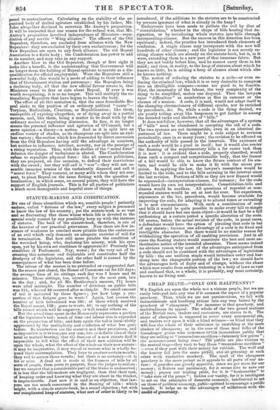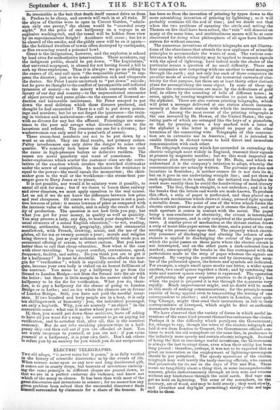CHEAP DEATH—" ONLY ONE HALFPENNY!"
WE English are upon the whole not a vicious people, but we are easily betrayed into any vice if it assumes the aspect of a popular quackery. Thus, while we are not parsimonious, we fall with indiscriminate and headlong ardour into any trap baited by the quackery of " cheapness." For immense is that quackery, and multitudinous its appeal. The whole of the two grand sectiOns- of the British race, traders and customers, are slaves to it. The name of cheapness is supposed to cover every commercial sin, and traders rest upon it with a blind reliance—so blind that they will lose the whole of their substance in snatching at the mere -shadow of cheapness; as in the case elf those mad folks of the linendraper genus who announce ttf-the incredulous public that they are selling at " tremendous sacrifices—ininotisly low prices "; the announcement being true! Tlie public are also victims to the mutual trap—they rush to buy those "tremendous sacrifices —even if they part with their money for rubbish. The wolf and the hunter fall into the same pitfall, and sit grinning at each other with vindictive mockery. The spell of the cheapness quackery is the more potent as it appeals to all parts of our na- ture : it gratifies our greedy appetites, since we get more for our money ; it flatters our parsimony for it seems also to save our money ; piques our trading pride, for it is "businesslike" to "take care of the pence " ; tickles our vanity, for it is intelligent to act on the principles of domestic economy, intellectual to act on those of political economy, public-spirited to encourage a public benefit. It helps us to the advantages of selfishness with the credit of generosity. So irresistible is the bait that death itself cannot drive us from it. Profess to be cheap, and crowds will rush in at all risks. If the abyss of Curtius were to open in Covent Garden, " admis- sion only one penny," the chasm would be "crowded every night." Set the price of one halfpenny on a voyage in an explosive washing-tub, and the vessel will be hidden from view by its superincumbent freight! Accidents will occur ; but let it be cleared of the smoke, and the giddy crew will be on it again—. like the habitual dwellers of towns often destroyed by earthquake, or flies swarming round a poisoned bowl.
Great is the indignation, however, and the explosion is echoed by loud cries for authoritative intervention. These accidents, say the indignant public, should be put down. " The Legislature," that universal scapegoat, is abused for not having found a bill to cork up these explosions. Thus it is always: we go on adding to the causes of ill, and call upon " the responsible parties" to sup- press the disaster; just as we make ourselves sick and vituperate the doctor. Sir Peter Laurie undertook to "put down" suicide; but he gave no thought to the conflict of incompatible self-inflicted tyrannies of society—to the misery which contrasts with the luxury of our day and country—to the unprecedented encounter of abject poverty and purse pride—to the excesses of licensed se- duction and inexorable intolerance. Sir Peter essayed to put down the mad delirium which those diseases produced, and thought he had succeeded ! There is a call to put down poison- ings and murders; but let us not forget the ignorance—the train- ing in violence and malevolence—the custom of domestic strife, with no divorce for any but the affluent. Poisonings are some- times to the poor and savage what divorce-bills are to the luxurious and refined. The countess can sue for a divorce; her washerwoman can only send for a penn'orth of arsenic. These steam-boat accidents are not to be put down by a word or an edict. They are final results, not primary causes. Paltry interferences can only drive the danger to some other quarter. We scarcely look below the surface when we seek the cause in high-pressure boilers or defective rudders. The causes are moral quackery and want of conscience. The boiler-explosions which scatter the customer class are the corre- latives of the exaction which crushes the wretched sbirtmaker under the screw of competition. In mechanics the resistance is equal to the power—the recoil equals the momentum ; the shirt- maker goes to the wall or the workhouse—the steam-boat pas- senger goes to Davy Jones or to pieces. It is not possible, nor would it be salutary were it possible, to annul all risk for man ; but if we desire to lessen these railway and river disasters, we must apply ourselves to the real causes. Let us ask if we do not know the difference between low price and real cheapness. Of course we do. Cheapness is not a posi- tive lowness of price: it means lowness of price as compared with the intrinsic value of the article, and is solely the result of facil- ity of production. The question is not how little you pay, but what you get for your money, in quality as well as quantity. You may procure a lady, any day, to teach your daughters " the usual elements of a sound English education,"—to wit, reading, writing, arithmetic, history, geography, plain and ornamental needlework, with French, drawing, music, and the use of the globes, all for ten or twenty pounds a year ; morals and religion being thrown in, just as your milkman respectfully sends you an .occasional offering of cream, to attract custom. But you know letter than to call that cheap education. Now what is the case .with river travelling. You expect comfort, convenience, speed, .frequency, facility, and safety. Do you think you are to get it for a halfpenny? It must be doubtful. The sum affords no mar- gin for " verification" ; which is especially needed in this bar- gain, because your own body is staked on an honest fulfilment of the contract. You mean to pay a halfpenny to go from the Strand to London Bridge—not from the Strand into the air with the boiler : but there is little margin in the narrow circle of the halfpenny to be the fee for verification. What you do, there- fore, is to pay a halfpenny for the chance of going to London Bridge or to Lethe ; and on the whole the chances are in favour of London Bridge. Still, you have not paid the needful insur- ance. If two hundred and forty people are in a boat, it is only ten shillingsworth of humanity : you, the individual passenger, are only a hap'ortb. Why, you are scarcely " an object " in the mercantile sense : what can it matter where you are shot?
If, then, you would put down these accidents, leave off asking to have all you want for a song ; be content to go on paying for :verification, and be satisfied that, after all, this is the soundest economy. But do not take sneaking pleasure-trips in a half. jenny ship and then call out if you are offended or hurt. You
are worth twopence to yourself, or you are not : if you value yourself at a halfpenny, it is your own fault. Don't ask others to refute you by an anxiety for you which you do not reciprocate.



























 Previous page
Previous page